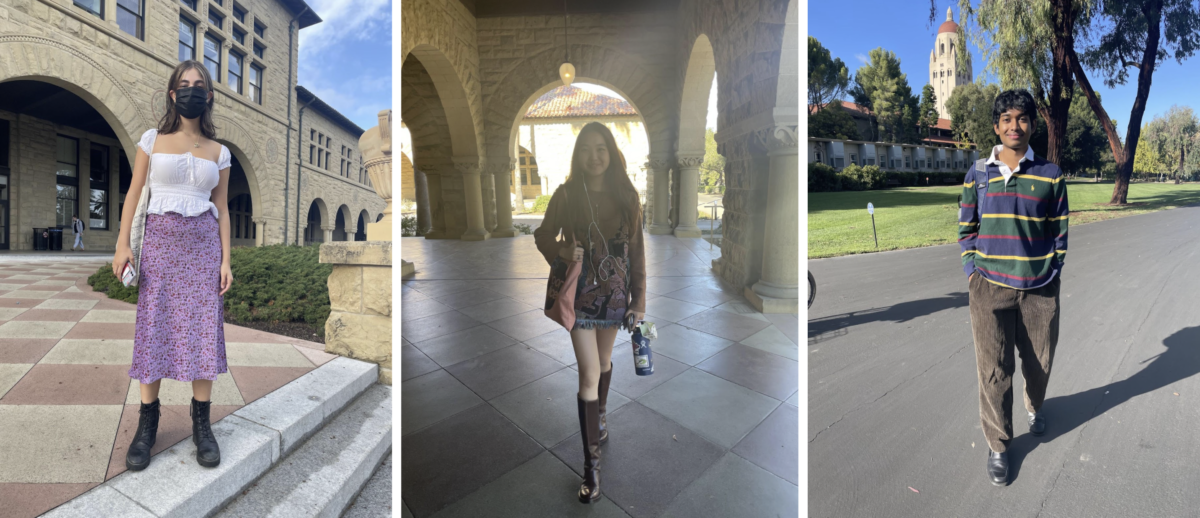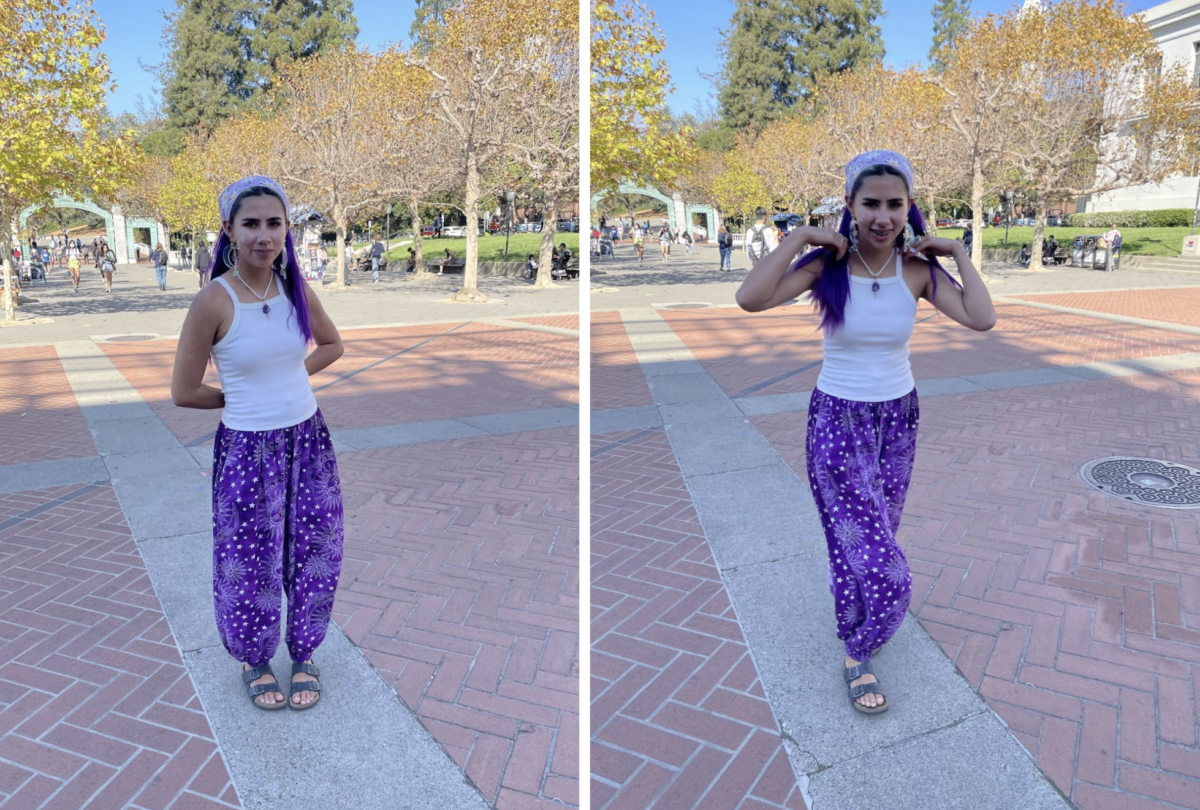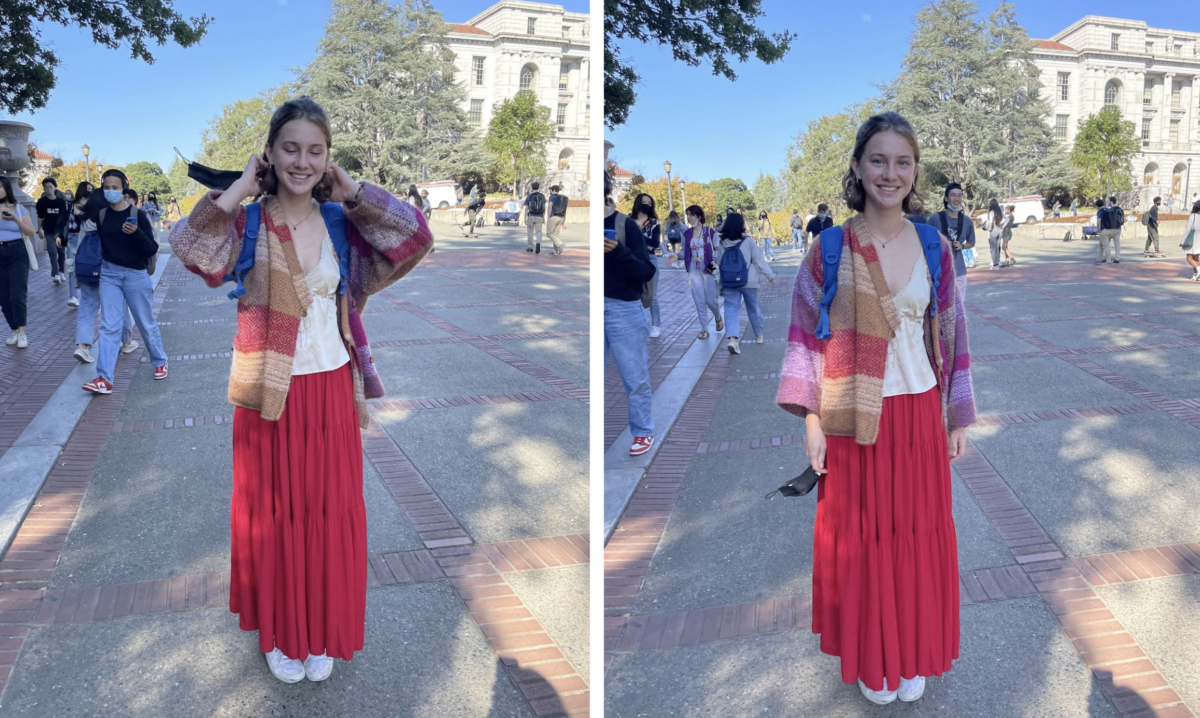
There is something distinctive about college fashion; call it the boldness of youth or the excitement of independent-living. Universities welcome students from across the globe, coming together to form a melting pot of ideas, lived experiences and customs. Students choose to signal who they are — their values and identities — in a number of ways. One of those methods is the time honored, age-old individualistic tradition of wearing whatever the heck you want (yes, even socks and sandals).
As Big Game rolls around, I was inspired to take a closer look at the differing fashion cultures of Stanford and Berkeley. At Stanford, I’m constantly surprised by the innovative spirit of my peers, especially as it translates into self-expression. I thought, surely, Berkeley must have similarly unique fashion. In order to gain a deeper understanding of this phenomenon, I spent a time on both campuses snapping shots of eye-catching outfits and chatting with some of the students that put together the looks. I learned that there is no shortage of stellar, head-turning regalia at each university. Students convey stories through their chosen outfits, letting clothes transcend their material existence, becoming art.
Innovation and confidence at Stanford
On the farm, clothes act as a projection of some internal reality, and reality is often fluid. If plagued by the fatigue of studying for that chemistry midterm all night, reality is probably a trusty pair of black leggings paired with a favorite Stanford sweatshirt. Casual cardinal attire seems to be a go-to look on campus, satisfying the criterion of comfort and style.
Despite this, Stanford’s innovative philosophy still shines through as students express themselves in captivating ways. Students are brimming with opportunities to express some unique perspective through fresh, new fashion. This is visible everywhere. Take Coffee House (better known as CoHo), where young philosophers engage in heated verbal battles over ethics or current events. Their chosen armor? Perhaps an elevated pair of timeless Chuck Taylors, a midnight black turtleneck and a cheetah print mini skirt. The weapon of choice? The enthralling confidence of the wearer as they carry themselves with absolute certainty.
This powerful clothing confidence is evident in Main Quad, where, skating down past Memorial Church, zips a flash of soft, earthy tones. A pair of tangerine skates act as their vessel while a draping sunset skirt, a cotton-hazel bandana and a basil tube top cut through the wind.
Even in the solemn Green Library, students are busy expressing themselves. One look on the grand staircase caught my eye; a Stanford cardinal fitted in a marble-gray pullover with a burgundy collar peeking out from beneath the outer layer. A black pair of cuffed chinos is accentuated by a smoky-hued, chord-like belt. Silver and gold adorn the student’s fingers and neck like the sweat of the sun and tears of the moon.

At Stanford, logic isn’t intrinsic to student attire. Instead, ensembles often rely on the feelings and instincts of the wearer. Sometimes there is no reasoning behind what brings us joy as we retain our respective tastes for the sake of simply being. At Stanford, the various styles reflect a myriad of student understandings. These looks range from: haute and sumptuous or sporty and clean to nostalgic and evocative or grunge and edgy.

Experimentation and freedom at Berkeley
Meanwhile at Berkeley, it’s as if the city itself breathes life into students’ fashion statements, ebbing and flowing like the streets that surround the University. Now picture this: Sproul Plaza. Telegraph Street. To the Berkeley regular, the words evoke vivid imagery: hordes of people socializing and moving in currents, boutique shops minutes away from the dorms. This means fashion — lots of it.
To be one with fashion culture at Berkeley is to continually defy expectations and contribute to the unique culture of protest. Though, Berkeley students similarly lean into athleisure like those on the Farm, largely favoring the comfort of their university paraphernalia.
However, the reality I witnessed was nebulous (and slightly reminiscent of Stanford); colors and wild textures in surprising configurations flooded my vision, and it was all at once blinding and deafening.
Along the street I ran into students decked out in velvet 2000s crop tops, distressed acid-wash bermuda shorts and chunky, polychromal Nike Air Maxes.

Others walked past me in majestic palazzo pants and heads of perfectly color-matched purple hair.

Sitting upstairs at Cafe Milano was a student sipping coffee in a delicate pearl silk tank, topped by a multi-patched crocheted cardigan and a voluminous strawberry-red skirt.

Something about fashion culture at Berkeley struck me as riveting, perhaps because I entered the space as an outsider. However, the openness of the campus seemed to contribute to this atmosphere of freedom and experimentation. Compared to the very self-contained “Stanford Bubble” I’d been living in for the past seven weeks, Berkeley life was a small breath of fresh air.

Diversity and overcoming barriers in each microcosm
While my opinions are inherently biased due to my status as a Stanford affiliate, and my short time at Berkeley gave me a limited perspective of its fashion culture, a few things remain clear. The stylistic differences of the students do not necessarily lay in what they choose to wear. Rather, the differences lie in the perceptions of what others expect them to look like.
At both universities geographical factors definitely come into play, determining accessibility to fashion in regards to proximity and cost. At Stanford, getting new clothes is a sizable journey—by bus, Uber or LYFT. While the Stanford mall sits ten minutes away from campus, many of the department stores carry luxury brands and pricey products, an unideal situation for the regular, frugal college student. More affordable clothing stores in the area like Macy’s appeal to cost but do not necessarily meet student’s standards of spunk or style. A few thrift stores situate themselves in the region but remain out of easy, walking distance like those in Berkeley. At Cal, one has a seemingly endless supply of boutiques along the road minutes away from student dorms. Similarly, the many fresh, trendy San Francisco shops are only a twenty minute drive from Berkeley’s campus.
Despite these differences, both student bodies act as microcosms, forming their own unique fashion cultures as they navigate their local barriers and expectations. Each culture establishes its own distinctive trends and norms, contributing to each university’s greater narrative of diversity and innovation.
Editor’s Note: This article is a review and includes subjective opinions, thoughts and critiques.
Article From & Read More ( So you think you can dress: a comparison of fashion culture at Stanford and Berkeley - The Stanford Daily )https://ift.tt/3Cw3uQZ
Fashion
Bagikan Berita Ini














0 Response to "So you think you can dress: a comparison of fashion culture at Stanford and Berkeley - The Stanford Daily"
Post a Comment